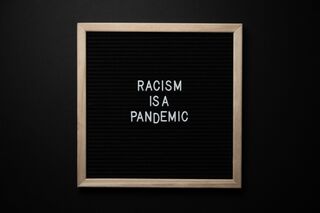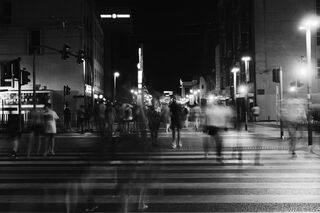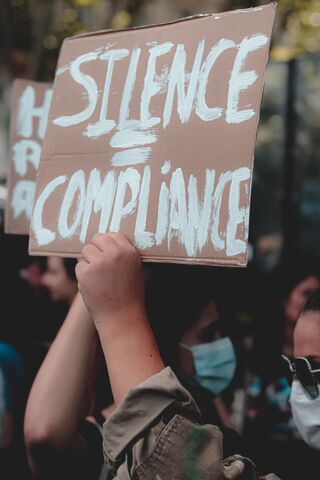Bias
White Supremacy Is About More Than the Far Right
White people do not need to believe in White supremacy to benefit from it.
Posted January 11, 2021 Reviewed by Lybi Ma

This is a guest post written by Ursula Moffitt, Ph.D.
Dr. Moffitt is an NSF Postdoctoral Fellow working with Professor Rogers in the Department of Psychology at Northwestern University. Her research focuses on contextualized racial, gender, and national identity development through a social justice lens.
Among the throngs of predominantly White Trump supporters storming the Capitol last week were members of the Proud Boys, a group founded on an “anti-White guilt” agenda. The Proud Boys have become increasingly visible in past months, including for tearing Black Lives Matter banners from two historically Black churches during a December rally in Washington, D.C., setting fire to one and tearing the other apart.
Despite having become a symbol of White supremacy, the Proud Boys have repeatedly disavowed claims of racism.
Why would members of this violent group claim not to be racist? Relatedly, what does White supremacy mean, and how is it linked to racism?
As an ideology, White supremacy is the belief that White people are inherently superior to People of Color. As old as the concept of race itself, European and U.S. scientists and politicians relied on White supremacy to construct racial hierarchies justifying the dehumanization, enslavement, and genocide of African-descent and Indigenous people. Since the abolition of slavery, White supremacy has shaped society in official (legal racial segregation, redlining, forced assimilation of Native Americans) and unofficial ways (ongoing racial segregation, over-representation of White people in politics, corporate leadership, media). Racial inequality today is directly related to the White supremacist hierarchies created centuries ago.

Racism is therefore best defined as a system of advantage based on race. White people do not need to believe in White supremacy to benefit from a system founded on it.
Yet, in both mainstream use and academic research, racism is often framed only as prejudiced beliefs and behaviors. This obscures the structural foundations and systemic nature of racism, and has turned “racist” into an insult. When President Trump is called out for racist remarks, many supporters are outraged. In an Atlantic interview, one woman said she was “sick to death” of the accusation of racism. It makes sense that the Proud Boys would distance themselves from the word, even if their actions tell a different story.
Understanding Whiteness as Part of the System of Racism
Research has shown that White people, including left-leaning activists, often respond more vehemently to being called racist than to racism itself. The reasons for and consequences of this cannot be understood solely by studying racist beliefs and behaviors. Instead, there is a growing push to examine Whiteness (as a key element in the ongoing system of racial stratification) and White identity (as an important factor in how this system is upheld).
The terms “Whiteness” and “White identity” often call to mind groups like the Proud Boys. But because racial hierarchy shapes U.S. society, race impacts everyone, whether they are explicitly aware of it or not. Race is a powerful social construct, and racial identity includes the ways that people understand themselves in terms of race and its impact.
Why Whiteness Is Often Invisible, and Why That Matters

In general, White people easily self identify as White. But when asked about Whiteness and racial identity, they often have trouble answering. Sometimes even talking about race is considered racist. This reflects a tendency to think of Whiteness as normal, neutral, and invisible, and race as something “other” people have.
Psychologists have found that White people may be motivated to maintain this perspective. When White people are confronted with the reality of racial privilege, a common response is to recount non-race related struggles. White people are more likely than Black people to be taught and believe that hard work is all that is needed for success. If this meritocracy belief is shaken, it may push White people in one of two directions, towards denying the existence of privilege and distancing themselves from Whiteness or working to dismantle racial privilege. Which direction people take is affected by personal and societal factors, and this is the crux of racial identity development.
Isn’t It Better to Just Focus on Our Similarities?
In a current study with White children and adolescents, my colleagues and I found that older youth were more likely to be reflective about their racial identities and recognize racial inequality. One girl said in 6th grade that race “doesn’t really matter,” but by 8th grade, she noted that being White can give people unearned privileges, which she described as “not good” but “worth knowing.”
Not all youth in our study showed change in their racial identity, and a few went the other direction, more firmly defending colorblindness, or the notion that race is inconsequential. Although seemingly neutral, colorblind beliefs are linked to increased racial bias and decreased recognition of overt racism. Because racism exists, pretending that race does not is harmful, not helpful.
Psychologists find that colorblindness is learned. White youth learn from parents and teachers not to talk about race. At the same time, they learn that Whiteness is normal, for instance from textbooks that focus on White perspectives, even though Children of Color make up nearly half of American youth.
What Should I Do to Be An Anti-Racist White Person?

The privileges associated with Whiteness mean that not questioning systemic racism or one’s role in it has advantages for White people. Only a minority of White people supports the violence of the Proud Boys, but all White people are enmeshed in the systemic racism shaping society. As Ibram Kendi has argued, “the opposite of ‘racist’ isn’t ‘not racist’.”
If you are a White person who was appalled by the violent storming of the Capitol on January 6th, but you feel uncomfortable thinking about your own racial identity, a first place to start is to ask yourself why that may be. If you want to go further, take a look at this website. Organized around the stages of psychologist Janet Helms’s White Racial Identity Development model, this list offers tools for sparking critical reflection, discussion, and engagement.
In U.S. society, racism permeates all aspects of our lives. Research indicates that it matters if and how White people choose to engage with their own racial identities in relation to this reality.
References
Smedley, A., & Smedley, B. D. (2005). Race as biology is fiction, racism as a social problem is real: Anthropological and historical perspectives on the social construction of race. American Psychologist, 60(1), 16–26. https://doi.org/10.1037/0003-066X.60.1.16
Tatum, B. D. (2017). Why are all the Black kids sitting together in the cafeteria?: And other conversations about race. Basic Books.
Salter, P. S., Adams, G., & Perez, M. J. (2018). Racism in the Structure of Everyday Worlds: A Cultural-Psychological Perspective. Current Directions in Psychological Science, 27(3), 150–155. https://doi.org/10.1177/0963721417724239
Dottolo, A. L., & Stewart, A. J. (2013). “I never think about my race”: Psychological features of White racial identities. Qualitative Research in Psychology, 10(1), 102-117.
Apfelbaum, E. P., Sommers, S. R., & Norton, M. I. (2008). Seeing race and seeming racist? Evaluating strategic colorblindness in social interaction. Journal of Personality and Social Psychology, 95(4), 918–932. https://doi.org/10.1037/a0011990
Phillips, L. T., & Lowery, B. S. (2018). Herd Invisibility: The Psychology of Racial Privilege. Current Directions in Psychological Science, 27(3), 156–162. https://doi.org/10.1177/0963721417753600
Cokley, K., Komarraju, M., Pickett, R., Shen, F., Patel, N., Belur, V., & Rosales, R. (2007). Ethnic Differences in Endorsement of the Protestant Work Ethic: The Role of Ethnic Identity and Perceptions of Social Class. The Journal of Social Psychology, 147(1), 75-89. https://doi.org/10.3200/SOCP.147.1.75-89
Knowles, E. D., Lowery, B. S., Chow, R. M., & Unzueta, M. M. (2014). Deny, Distance, or Dismantle? How White Americans Manage a Privileged Identity. Perspectives on Psychological Science, 9(6), 594–609. https://doi.org/10.1177/1745691614554658
Apfelbaum, E. P., Norton, M. I., & Sommers, S. R. (2012). Racial Color Blindness: Emergence, Practice, and Implications. Current Directions in Psychological Science, 21(3), 205–209. https://doi.org/10.1177/0963721411434980
Pauker, K., Apfelbaum, E. P., & Spitzer, B. (2015). When Societal Norms and Social Identity Collide: The Race Talk Dilemma for Racial Minority Children. Social Psychological and Personality Science, 6(8), 887–895. https://doi.org/10.1177/1948550615598379
Ullucci, K., & Battey, D. (2011). Exposing Color Blindness/Grounding Color Consciousness: Challenges for Teacher Education. Urban Education, 46(6), 1195–1225. https://doi.org/10.1177/0042085911413150




